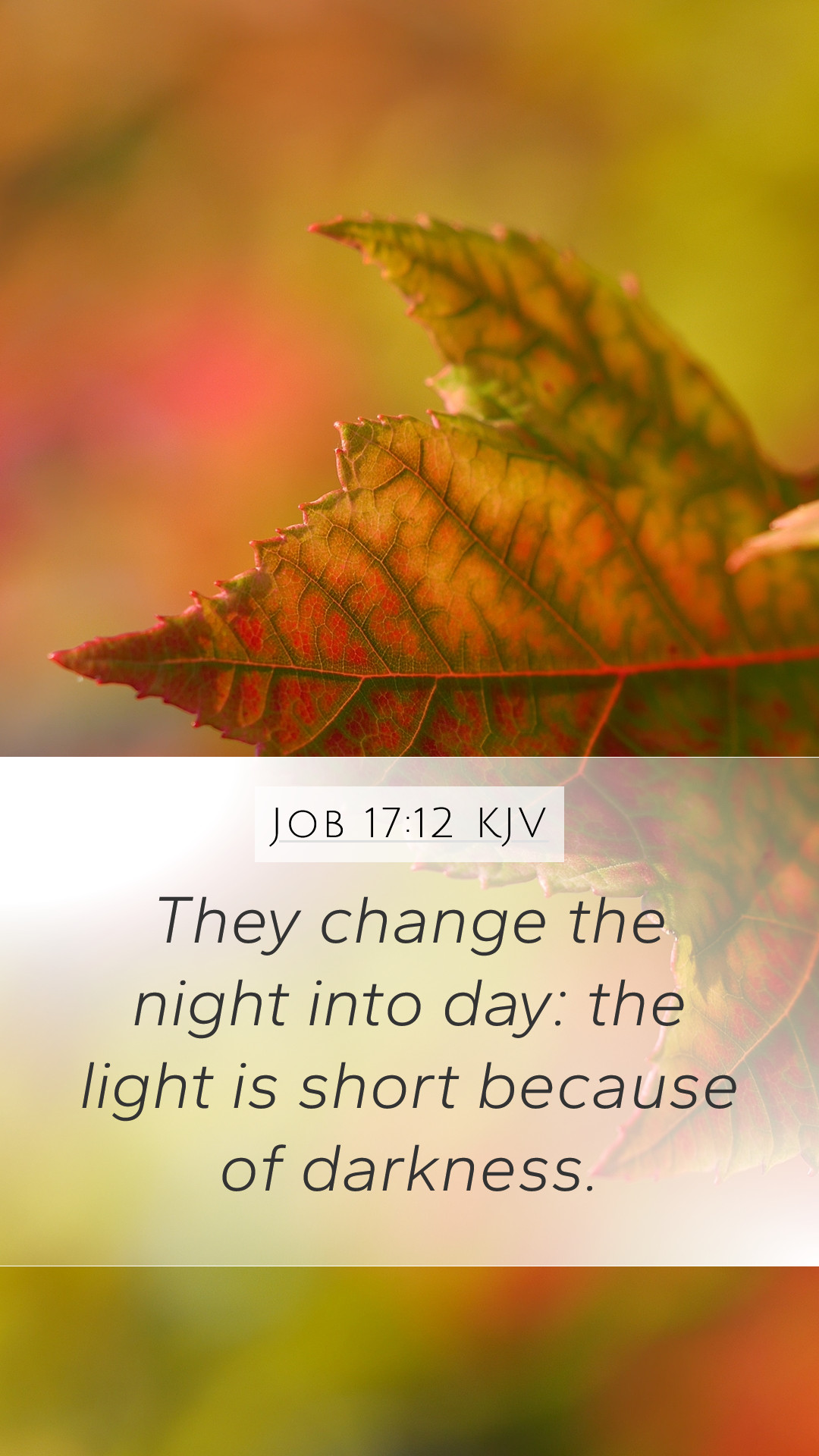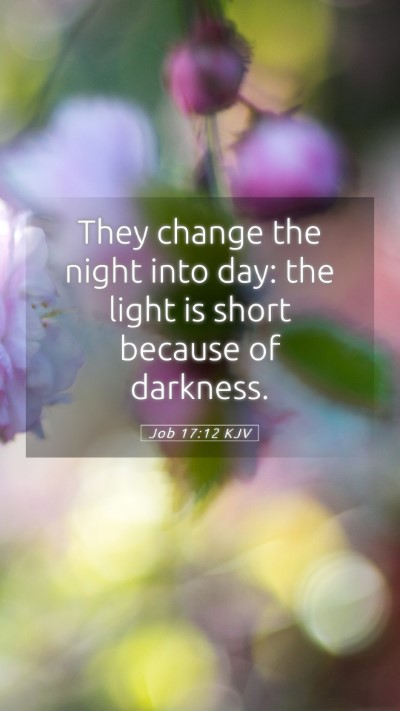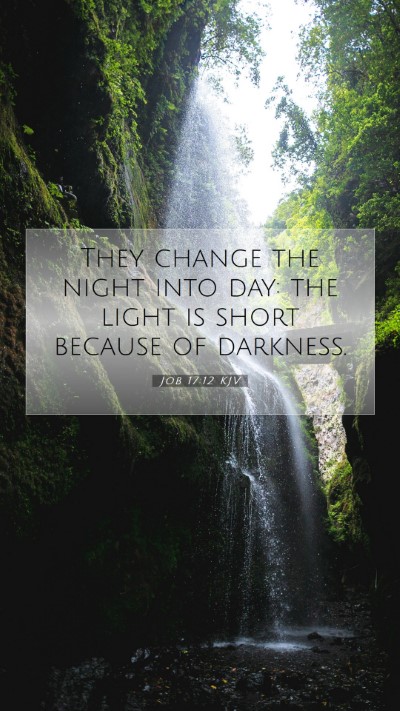Old Testament
Genesis Exodus Leviticus Numbers Deuteronomy Joshua Judges Ruth 1 Samuel 2 Samuel 1 Kings 2 Kings 1 Chronicles 2 Chronicles Ezra Nehemiah Esther Job Psalms Proverbs Ecclesiastes Song of Solomon Isaiah Jeremiah Lamentations Ezekiel Daniel Hosea Joel Amos Obadiah Jonah Micah Nahum Habakkuk Zephaniah Haggai Zechariah MalachiJob 17:12 Meaning
What is the meaning of Job 17:12?
They change the night into day: the light is short because of darkness.
Job 17:12 Bible Verse Meaning
Understanding Job 17:12
Job 17:12 states, "They change the night into day; the light is short because of darkness." This verse encapsulates Job's struggle with his deteriorating circumstances and his perception of the shifting nature of hope and despair. In this analysis, we will explore the verse's meanings through insightful commentary from notable theologians, including Matthew Henry, Albert Barnes, and Adam Clarke.
Meaning of Job 17:12
This verse reflects Job's profound feelings of hopelessness amidst suffering. It portrays a situation where night, typically associated with despair, is presented as if it could be changed into day, symbolizing hope. However, the darkness persists, signifying the challenges Job faces and his feeling that what once provided light or hope is now obscured.
Bible Verse Interpretations by Theologians
-
Matthew Henry:
Matthew Henry suggests that Job's words illustrate how dark his situation feels. The reference to changing night into day metaphorically hints at how he perceives that the natural order of hope (light) is disrupted by overwhelming trials (darkness). Henry emphasizes the futility Job feels, as even attempts to see light are challenged by the weight of his suffering.
-
Albert Barnes:
Albert Barnes interprets this verse by drawing attention to the stark contrast between light and darkness. He notes that Job's despair leads him to wrestle with the concept of hope in the face of adversity. His notion that the light is cut short speaks to the brevity of hope in moments of extreme anguish. Barnes emphasizes the human tendency to seek light in dark times and the struggle that arises when that light seems to elude us.
-
Adam Clarke:
Adam Clarke elaborates on the theme of transition in Job's statement. He acknowledges Job's desire for relief from his suffering, reflecting a yearning for the transformed state of light amidst trials. Clarke describes how Job's plea embodies a universal struggle—the challenge of maintaining faith when darkness threatens to overwhelm. He points out that the darkness can be both external and internal, affecting one's spiritual state.
Bible Study Insights
For those engaged in Bible study groups or seeking online Bible study, Job 17:12 serves as an excellent starting point for discussions regarding the nature of suffering, hope, and faith. It can foster thoughtful engagement around the question of how believers perceive light and darkness in their lives:
- What does this verse illustrate about the human experience of darkness?
- How can we apply the essence of this verse when facing our own trials?
- What strategies can we employ to maintain hope amidst our difficulties?
Application of Job 17:12
The insights gained from Job 17:12 can be applied to personal reflections on suffering and hope. In Bible study lessons, consider how this verse encourages readers to confront the reality of their circumstances while also searching for faith and light during dark times. The verse is a reminder that maintaining perspective is crucial when faced with seemingly insurmountable challenges.
Historical Context and Significance
In examining the historical context of Job's story, it is essential to understand the deep cultural understanding of suffering during Job's time. The narrative depicts a man grappling with significant loss and pain, a relatable theme throughout Scripture that resonates with many readers today. There is also a theological significance in how Job's experience reflects a larger understanding of God’s relationship with humanity, particularly in moments of trial.
Cross References
This verse relates to several other scripture passages that offer additional insights into suffering and hope:
- Psalm 30:5 - "For his anger is but for a moment; His favor is for life; Weeping may endure for a night, But joy comes in the morning." - This verse contrasts darkness with future hope.
- Isaiah 50:10 - "Who among you fears the LORD and obeys the word of his servant? Let the one who walks in the dark, who has no light, trust in the name of the LORD and rely on their God." - This passage emphasizes faith amidst darkness.
- 2 Corinthians 4:17-18 - "For our light and momentary troubles are achieving for us an eternal glory that far outweighs them all." - A reminder of the transient nature of suffering contrasted with eternal hope.
Conclusion
In conclusion, Job 17:12 addresses the human experience of grappling with despair while yearning for light. The commentary by Matthew Henry, Albert Barnes, and Adam Clarke sheds light on how this verse speaks deeply to the heart of the struggle with faith in adversity. Understanding Scripture of this nature aids in forming a robust Bible verse commentary experience, enriching personal Bible study insights and enhancing group discussions.
Exploring such verses allows believers to gain profound insights into their personal experiences, leading to a greater understanding of divine presence even in the darkest moments. By considering this verse through the lens of hope and despair, we can foster a richer Bible study resource for ourselves and others seeking meaning and guidance through challenging times.


